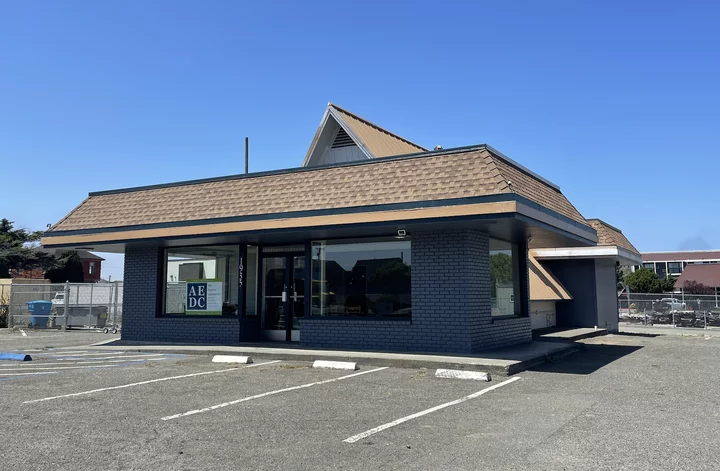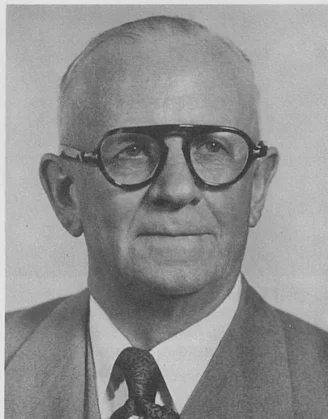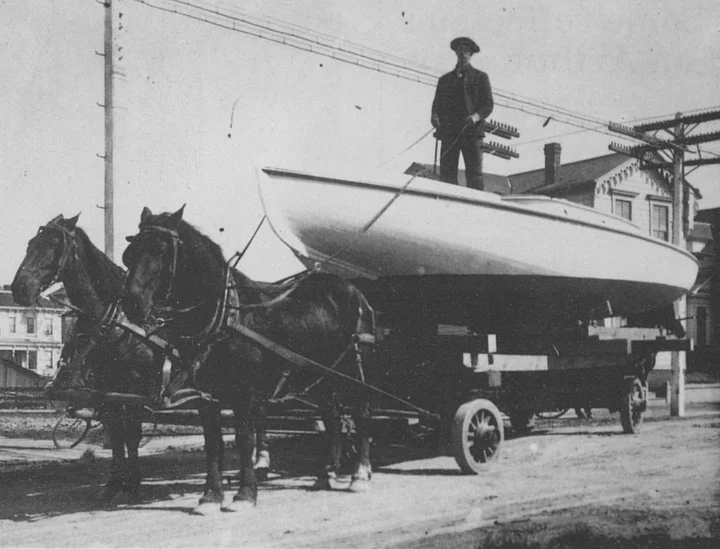Ferndale Man Arrested at County Fairgrounds After Allegedly Brandishing a Loaded Handgun, Threatening Someone With It
LoCO Staff / Sunday, July 14, 2024 @ 1:33 p.m. / Crime
Humboldt County, California - Ferndale Fairgrounds, Belotti Hall at left, Cattlemen & Cattlewoman’s building at right foreground. | Photo by Elin Beltz, public domain.
###
Press release from the Ferndale Police Department:
On July 13, 2024, at approximately 9:45 p.m., Ferndale Police Officers were dispatched to Belotti Hall inside the Humboldt County Fairgrounds where a private security company had reported they had a subject in custody who was believed to be armed.
Upon their arrival, Ferndale Officers contacted Lopez Valverde, Mauro Jose, 26, of Ferndale, Ca.
During the contact, Ferndale Officers located a loaded .45 caliber handgun tucked inside the front waistband of Lopez Valverde. Ferndale officers were then informed Lopez Valverde had brandished the handgun toward another individual while threatening them.
Lopez Valverde was taken into custody by Ferndale Police without incident, and transported to the Humboldt County Correctional Facility where he was booked on the following charges:
- PC 417(A)(2)(A) – Exhibit a concealed firearm in public,
- PC 25400(A)(2) – Carry concealed weapon on person, PC 25800(A) – Carry loaded firearm with intent to commit felony,
- PC 25850(A) – Carry loaded forearm on person in a public place.
BOOKED
Today: 4 felonies, 8 misdemeanors, 0 infractions
JUDGED
Humboldt County Superior Court Calendar: Today
CHP REPORTS
Alderpoint Rd / Sr36 (HM office): Traffic Hazard
498-799 Us101 (HM office): Trfc Collision-No Inj
ELSEWHERE
Governor’s Office: What they’re saying: strong support for Governor Newsom’s $200M ZEV program
KINS’s Talk Shop: Talkshop February 6th, 2026 – Miles Slattery
KINS’s Talk Shop: Talkshop February 9th, 2026 – Michael Davis-Hughes
GROWING OLD UNGRACEFULLY: Anti-Semitic?
Barry Evans / Sunday, July 14, 2024 @ 7 a.m. / Growing Old Ungracefully
“Conflating anti-Semitism with criticism of a modern apartheid state is dangerous historical revisionism.”
— Lela Tolajian, student and human rights activist
When I told my Jewish neighbor that I thought ritual circumcision was essentially mutilation of a baby’s body, she called me anti-Semitic. My response (I know, I should have just shut up) was, “Since I believe that routine cutting off the most sensitive part of a male infant’s body is a cruel and primitive practice, I’d be discriminating if I made it OK if the kid happened to be Jewish (or Muslim).” Our previously warm relationship turned tepid, and after that, we were simply cordial with each other. (She did tell Louisa later that she fainted at the sight of the mohel snipping away at her eight-day old son’s penis during his circumcision ceremony.)
Since the Hamas atrocities of last October 7 and subsequent IDF invasion of Gaza, the term “anti-Semitic” (or -semitic) seems to be a mindless and impulsive response to many who are critical of Israel’s scorched-earth policy there, including progressive Jews! (I can’t bear to call it a war, when only one side, employing airplanes and tanks, has killed nearly 40,000 civilians — including 10,000 children — and destroyed much of what was essentially a concentration camp for over two million refugees, their families having been driven from their homes by Israel. The ongoing “operation” in Gaza makes the 1982 massacres in Lebanon’s Sabra and Shatilla refugee camps seem hardly worth noting.)
I’m not even sure what being “anti-Semitic” means anymore. In its original, now obsolete, form, it meant being prejudiced against those of the tribe of Shem (one of Noah’s three sons, per Genesis), which can properly apply to Arabs, Jews, Akkadians, Phoenicians and a host of Middle-Eastern and African groupings. Obsolete it may be, but how can we square the “anti-Semitic” label with Jews from, say, the U.S., Germany, Russia etc? Seems to me, only Jews from the Middle East can be termed “Semitic.”
Today, the only legitimate use of the term “Semite” is in reference to languages. Semitic languages, spoken today by over 300 million people (including Arabic and Hebrew) lie within the Afroasiatic language phylum. Map: Miskwito, via Wikimedia. Creative Commons license.
(Ironically, the term was originally coined by journalist and politician Wilhelm Marr, 1819-1904, in his 1881 book The Way to Victory of the German Spirit over the Jewish Spirit, Jews, in his opinion, being responsible for all the ills suffered by Germany. Ironic because Marr made an exception when it came to marriage: Three of his four wives were Jewish.)
The real problem with the label “anti-Semitic,” and with labels in general (e.g. racist, bimbo, illegal, slut, retard, tranny, homo…) is that it creates defensiveness, stops discussion, and is just a lazy way to avoid facing up to our own fears and insecurities. I think my Jewish friends would agree.
(UPDATING) Former President Donald Trump Injured During Apparent Assassination Attempt at Campaign Event in Pennsylvania
LoCO Staff / Saturday, July 13, 2024 @ 4:20 p.m. / News
Former President Donald Trump was rushed off stage by security personnel after loud bangs were heard at the beginning of a rally in Butler, Pennsylvania on Saturday night. The Secret Service says Trump is safe and under protective measures. A spokesperson said Trump is “fine.”
Watch live updates from NBC News above.
# # #
(Note: The headline to this post has been updated to reflect new information learned since it was initially posted. Further information about this incident can be found at the New York Times or other outlets.)
THE ECONEWS REPORT: Top 10 Questions About Offshore Wind
The EcoNews Report / Saturday, July 13, 2024 @ 10 a.m. / Environment
Offshore windmills being assembled in Massachusetts. Photo: Tom Wheeler.
Northcoastoffshorewind.org is a new website designed to provide objective answers to some of the most frequently asked questions about offshore wind with links to primary sources. On this week’s show, Matt Simmons of EPIC and Jen Kalt of Humboldt Waterkeeper answer the top 10 most frequent questions that we get about offshore wind. Want to learn about whales, birds, fish and more? Listen in!
The Tasty Hub, a New Commissary Kitchen in Eureka, Plans to be a Food Scene for Vendors, Eaters, and Maybe Much More
Jacquelyn Opalach / Saturday, July 13, 2024 @ 9:33 a.m. / Food
Tasty Hub owner Gabrielle Long (center) and Eureka Mayor Kim Bergel (holding the big scissors) at the ribbon cutting on Monday, July 8. Photo by Carly Wipf, courtesy of the Greater Eureka Chamber of Commerce.
Seated at a dining table in her empty – but technically open – new business, Gabrielle Long described what the Tasty Hub will be in the coming months: a community-oriented food scene with regular vendors in the parking lot and a dining area inside, but also a venue for food-related community events, teach-ins, or whatever else folks dream up for the space.
But the new commissary kitchen in northern Eureka, which opened officially on Monday this week, isn’t quite there yet. The kitchen itself is fully stocked and ready to go; now it just needs chefs.
Long’s business is the foundation of a plan that relies on other local businesses to operate. It is now up to those in the mobile food industry – already existing or new to the scene – to make the Tasty Hub vision a reality.
A commissary kitchen is a rentable commercial kitchen typically used by food trucks, vendors, caterers, nonprofits or other food-related business ventures. These “mobile food facilities” (usually) legally depend on commissary kitchens to operate. Though there are a few commissary kitchens in Humboldt, the area’s recent food truck boom has created a demand for more.
That’s one of a few reasons Long, who also owns A Taste of Bim and the Grind Cafe, decided to open the Tasty Hub. “I’ve been hearing that chant: ‘there’s not enough kitchens,’” Long said. “‘Kitchens, kitchens, kitchens.’” Commissary kitchens, Long pointed out, are a resource to people who want to break into the food industry but don’t have the money or resources to do it the old-fashioned way.
But the Tasty Hub is a bit different from your average commissary kitchen. Beyond using the facilities and storage space there, food vendors may, if they wish, secure a permit to sell their food onsite.
The goal is “to build community, because we’re stronger together than apart,” Long said. “What better way to have people helping each other, working together in a place that can help uplift, and help the community thrive.” Long is stoked with the traffic-heavy location and was happy to restore the unique building, which was once the long-time home of The Chalet House of Omelettes but has been vacant since 2020.
“It’s always good when you can take something like that and make it positive, and turn it into something that people can use and benefit from,” Long said.
The Tasty Hub building, located at 1935 5th Street, is lookin’ spiffy. Photo: Jacquelyn Opalach
She hopes the Tasty Hub will become a safe space for underserved communities, Long said, like folks of color and the queer community.
That hope might manifest in a partnership with a local nonprofit called Pathways of Purpose, which facilitates learning programs for underserved transition-age youth (16 to 24). Dr. Susanne Sarley, who co-founded the organization with her husband Aerin Monroe in 2021, said they’ve been looking to add some vocational training programs to the nonprofit’s offerings.
“We think that it will be a great place to train transitional age youth in not only the culinary arts and cultural foods and knowledge and healthy eating – which is all connected to our model,” Sarley said, “but also we’re thinking about the potential of perhaps doing a garden where they could learn farm-to-table practices, because my husband is an agricultural farmer. So there’s some really good potential for that site, and for our partnership with Tasty Hub.”
Both Long and Sarley noted that those ideas are preliminary. For now, the Tasty Hub (itself a for-profit business) needs to get off the ground and running. At this point, it’s up to food people, new or seasoned, to get involved.
Long said that people can rent the kitchen by the hour or secure a longer-term lease agreement with Tasty Hub. There are overnight parking spaces for three food trucks, and other vendors, like food stands, can store equipment onsite, too. Once applications are approved and all the necessary bureaucratic stuff is good to go, folks can get on a schedule to use the kitchen, sell food onsite, or do some other cool food thing at the Tasty Hub. Three businesses have already started the process.
Long said to contact her for the application by email at atasteofbim@zoho.com or by phone at (707) 298-7099. You can also keep an eye out for the Eureka Chamber of Commerce newsletter in the coming week, which will detail how to apply.
“Here’s your opportunity now to do what you’ve been dreaming of,” Long said. “I’m excited and I can’t wait to see how it will help people bring their business ideas to fruition.”
HUMBOLDT HISTORY: Who Was A.W. Way? Yachtsman, Statesman and Namesake of One of the County’s Prettiest Parks
R. Chalmers Crichton / Saturday, July 13, 2024 @ 7:30 a.m. / History
Incidentally, in order that I may qualify myself as one knowledgeable of many changes, as Eureka has developed over the years, I might tell of my own background. I was born in Eureka on the 5th day of March, A.D. 1879. My birthplace was in the William Brett cottage located on the southwest corner of 5th and D streets. My mother’s maiden name was Emily Pengilly Way and my father was Henry Way. Mother was a native of England where she lived and was a pupil teacher at Weymouth until she came to this country.
— Arthur W. Way
The above information is from the beginning notes for a talk that the late Arthur Way prepared many years ago. He had been called upon to speak before numerous groups including the Historical Society, meetings that were held in Eureka and at Mattole. I feel fortunate to have shared in reviewing these thoughts used in his preparation to entertain at a function the majority of us were unable to attend.
Arthur W. Way, one of their three children, was born March 5, 1879. His mother gave him his elementary school education. He mentioned playing ball in passing, but not many know that he was a star football and baseball player when he attended Winship High School. It was some time after his graduation from Winship that he took up the study of law and passed the Bar examination.
Following his death the newspapers said: “There are not many who ever heard of the other Arthur W. Way—the intrepid sportsman, the athlete, the volunteer fireman, the attorney who for years fought for the causes of the Indians, the champion yachtman who for more than a half century set a record which has never been broken.”
When he was 37 years of age, he accomplished an almost impossible task of salvaging most of the cargo, ship’s gear, and equipment that was aboard the S.S. Bear, the wrecked steamer off Cape Mendocino on June 14, 1916.
The area is not readily accessible today, but was almost impossible to reach at that time. Arthur and his crews built temporary roads and bridges and laid railroad ties down the beach placing them not more than four feet apart. They used the funnels from the Bear for culverts at several streams. It made for a rough bumpy road but served the purpose.
He sent to Switzerland for three narrow-gauge trucks to bring the salvage to Ferndale, and used 35 four-horse teams around the clock to accomplish the task which even the insurers felt couldn’t be done. It was acclaimed at that time as the greatest engineering and salvage job of its kind in the world.
The Oreades shows its speed in this run on San Francisco Bay.
In the yacht Oreades, which he and William S. Clark built on Humboldt Bay with no previous knowledge of boat building. Way and an Eureka crew entered the San Francisco Bay Regatta. On that day. May 25, 1913, the San Francisco Yacht Club saw the visitors make a clean sweep, taking the perpetual trophy away. This was a trophy San Francisco Yacht Club had held for 34 years and one that had never left the San Francisco Bay area in its existence of 85 years. It is noteworthy what the newspapers said in their reporting of Art Way’s achievement: “It is typical of the man that he always gave full credit to his crew for the astounding victory over the cream of the yacht fleet at San Francisco.”
And so to keep faith, let us look at that crew of the Oreades: Art Way was Skipper, with him were, H.L. “Toppy” Ricks, William S. Clark, R.J. Kellen, Bernard B. Bartlett and William Kressman. All were members of the Eureka’s Sequoia Yacht Club. Today the Humboldt Bay Maritime Museum has a display of some of Arthur W. Way’s cups and memorabilia.
Before going to another subject, what was the background for this dramatic takeover? The story of the Oreades’ origin is almost as fantastic as some of the other events in the Way saga.
It was two years before the great race. Way and his close friend, W.S. Clark, had heard of a beautiful yacht — a 35 footer which had won the Great Lakes Championship against supposedly superior craft.
They sent east to the Small Brothers for the plans, which cost them $135 — a whale of amount of money in those days. Neither one of them had ever built a boat before.
Clark had a good-sized shed at his home at Whipple (14th) & C sts. When the plans arrived. Way rolled them open on the shed floor and Clark figured them out.
They started to work — on two vessels. Clark named his twin of Art’s the “Calypso.”
Only the mast and spars were farmed out, to be shaped from native Humboldt fir. The rest, Way and Clark did themselves. There was one hitch that was a cartoonist’s classic: When their neat, trim crafts were completed, they were too big to get out of the shed. One end of the building had to be knocked out to release the boats.
Cochrane’s Team and Dray hauled the Oreades from its building site to a launching in the bay at the foot of C Street. The driver in this 1908 photo is George Cochrane.
Then they needed help so Cochrane’s dray came to move them to the foot of C Street where Mercer Fraser had a piledriver. Its rigging was used to launch the two boats. The Way boat was christened “Oreades” (named for a Greek sea nymph).
Then the fun began. The two fellows were the best of friends — anywhere except at the tiller. There writers said, they showed “tooth and fang.” Way once recalling race experiences said, “I could beat her (the Calypso) by 14 seconds in seven miles every time.” He had the “feel” and the “knowhow.”
So after much local practice, the San Francisco race of May 25, 1913, was entered and arrangements were made to ship the boat to San Francisco aboard the S.S. Vanguard.
The day of the race the last survivors in the eliminations were the two boats, the San Francisco yacht “Challenger” and Way’s “Oreades.”
Over a hundred boats were entered and there had been much more wind than they needed. It was nip-and-tuck in the stretch. They were on the last lap and rounding the stake boat. Under the strain of the terrific wind the turnbuckle holding the “Challenger’s” bowsprit, which in turn held the mainmast guy, broke and down came mast and canvas.
On the “Oreades,” at the same time, it called for every ounce of strength and every shred of experience. Kellen was the mainsheet man, and Bartlett handled the jib and was in charge of the balloon spinnaker and water-sail, if needed. Now the whole object was to prevent the loss of her own sticks. Skipper Way controlled the tiller with an unbelievable smoothness and she breezed across the finish line — and to the championship — intact. San Francisco papers blazed the story across their front pages.
Arthur Way was very modest but at the same time ecstatic. He said, “Teamwork won it,” and stuck with this remark for years and years after. However all present at the event attested to the superior seamanship of Arthur W. Way, skipper of the Oreades.
It is a fact there are other little-known “firsts” during his long career. An example, the first motor truck to reach Bridgeville was driven by Arthur W. Way.
Arthur is credited with being the key person on forming the Sequoia Yacht Club and constructing its spacious, imposing building on Günther Island.
In 1916 Arthur Way purchased 30 some acres near the mouth of the Mattole River, southeast of Ferndale. There he initiated, and carried out each Fourth of July what developed into a huge celebration in honor of his small daughter, Dorothy. Today she still remembers the many big metal containers of ice cream that he transported for the event. He spent large sums for the picnic and fireworks. The celebration was free for all who would attend.
Now of course the Mattole Grange has been the sponsor of the Annual Fourth of July Celebrations and other picnics, dances, barbecues, etc. It was on October, 1961, that the Mattole Grange honored Arthur by having a “Way Day.” Invitations were extended all over the country to have his friends attend the picnic. It was a time when speeches were heard from the late Frank P. Belotti, as the main speaker and Martha B. Roscoe as M.C., but most important was the opportunity for people to express their appreciation and congratulations to Arthur, honoring him on his 82nd birthday. And some came to say thanks for the trucks he sent to flooded country in 1955 to help people, or for personally planting fish in some streams long before the state took over or for the setting aside of Ferndale’s streams for children’s fishing only and he fostered many other worthwhile projects. Yes, “Way Park” at Mattole is named in his honor.
For two terms he served the City of Eureka as its mayor. (Emily Jones succeeded him in that office.) Years later he entered the political arena of the State of California. He was sent to the California Assembly, from the First District in 1948 and after serving that year and 1949 he was selected for the State Senate where he served from 1950 to 1956.
Those who know, credit him with taking an active role in highway development. He gave top priority to both the development of Highway 1 from San Francisco north to Oregon and the improvement of Redwood Highway. The Redwood Highway Association acknowledges that he was one of the earliest proponents for the shoreline highway and took an active roll in many matters of their Association.
Arthur Way and the late Richard Denboe are credited with starting the Annual Crab Feed still held in Sacramento by Humboldters.
He was the founder and owner-operator of the former Redwood Empire Freight Lines and was the first to bring a refrigeration truck to the area. He operated several trucks regularly between San Francisco and Eureka. Way’s Garage was located at 7th & D streets. In earlier years he was a partner in the auto sales firm known as Mercer- Way. Some of the autos they sold and serviced were Lozier, Chalmers, Flanders, Hupmobile and Studebaker and they also had International and Mack trucks.
When he was president of a men’s club, known as “Knights of the Roundtable” he proposed they start a youth club, “perhaps at the high school, the men could act as advisors and direct the youths in looking for places to serve, etc.” The club known as Excalibur came into being and the idea quickly caught on in other cities. This was the forerunner of the Interact and Key clubs sponsored by Rotary and Kiwanis service clubs today.
###
The story above was excerpted from an article originally printed in the July-August 1988 issue of the Humboldt Historian, a journal of the Humboldt County Historical Society. It is reprinted here with permission. The Humboldt County Historical Society is a nonprofit organization devoted to archiving, preserving and sharing Humboldt County’s rich history. You can become a member and receive a year’s worth of new issues of The Humboldt Historian at this link.
OBITUARY: Lillian Mae Hostler, 1929-2024
LoCO Staff / Saturday, July 13, 2024 @ 6:56 a.m. / Obits
Lillian Mae Hostler, affectionately known as “Mush,” was born on March 18, 1929, in Hoopa. She peacefully started her final journey on July 9, 2024, at the age of 95, surrounded by her loving family. As a proud member of the Hoopa Valley Tribe, Lillian was celebrated as the Tribe’s oldest living member, embodying a rich legacy of tradition and resilience.
Born during the early years of the Great Depression to Jimmy Jackson and Pearl Green Jackson, Lillian was the eldest of seven children. Her early years were filled with adventure and learning, particularly from her grandmother, Louisa “Old Gram” Jackson, who was born in 1887. Known for always following her “Old Gram” and Aunt’s, Lillian learned many stories, the Hupa language and traditional teachings that she cherished throughout her life. She was deeply rooted in the Hupa culture and was honored to dance in the Jump Dance as a young woman.
Lillian always deeply loved her parents and spoke fondly of them, showing them devotion and unconditional love throughout their lives.
Lillian attended Hoopa High School but contracted tuberculosis and was sent to a sanatorium in Fresno for a year and a half for treatment. When she returned home in 1946, she married Hilton Hostler Sr. and had two sons shortly thereafter. She worked as a clerk for Brizzard’s Store in Hoopa and Jordan’s Shopping Center, making many friends over the years. In 1975, Lillian remarried Robert “Bobby” Hostler, and they enjoyed 37 years of marriage. In 1970, they moved to Washington, D.C., where Bobby worked for the BIA and Lillian took a job at a pharmacy. Preferring active work over a desk job, she enjoyed her role as a clerk and made many friends while braving the East Coast winters.
Upon returning home, Lillian became the manager of the liquor store at Club Hupa, running the store and bar. She was known for her caring and considerate nature, yet she was tough as nails, handling unruly patrons and keeping the business going for many years. After retiring, Lillian worked at her sister’s restaurant, Laura’s Kitchen, as a hostess, waitress and all-around helper, socializing and exchanging stories with the patrons.
Despite the great heartache of losing both of her sons, Lillian remained steadfast in her commitment to love and support her family. She was fiercely devoted to her children and grandchildren, providing a safe haven and unwavering support. Her home was a place of warmth and sustenance, often taking in those who needed help the most.
Lillian was famous for making the best bread and beans, a recipe that no one could quite replicate. She would make a pot of beans every week, accompanied by her delicious fry bread or yeast bread, often sending visitors home with a loaf. One of the best gifts you could give her was fresh fruits and vegetables. During the summertime, she could often be found enjoying a plate of lemon cucumbers and tomatoes, visiting with family from her favorite spot on the couch with her legs tucked up to one side. Well into her eighties, Lillian maintained her strength and agility, regularly walking from her house on Redwood Grove Road down to the Trinity River for exercise and to cool off. Her ability to squat down to build a fire or find her bean pot in the back of the cupboard in her late eighties amazed her grandchildren.
The greatest legacy Lillian leaves behind is her example of unconditional love. No matter the circumstances, she loved wholeheartedly, offering support and compassion to all. Her life was a testament to strength, love, and community. Deeply rooted in her culture, Lillian often shared stories and traditions that kept the Hoopa culture alive. Her wisdom and compassion touched the lives of many, making her a cherished figure within the Tribe and beyond. Lillian is survived by her devoted sisters, Laura Ferris, Lila Gerstner (Jay Dee), Laura Lee George, and sister-in-law, Leslie Jackson; her brothers, Lincoln Jackson (Janet) and Zane Grant (Nita); and her beloved daughter-in-law, Jacque Hostler-Carmesin. Her legacy continues through her grandchildren, Robin Hostler, Donald Hostler (Mark Alsbury), Lillian “Buppy” Hostler, Michael Hostler Sr., and Heather Hostler. Her great-grandchildren, Lisa, Ashley, Brandt, Jazzy, Hilton III, Kameiko, Kamaria, Aneekah, John Silver, Coco, and Michael Jr., will carry forward the love she showed them. Her great-great-grandchildren, Blaine, Gerard, Christian, Donald II, Shayde, Elise, Alize, Deandre Michael, Zamarii, Rocky, Hallie, and Rori, along with countless cousins, nieces and nephews, will remember her with the deepest love and respect.
Lillian was preceded in death by her cherished sons, Hilton Hostler Jr. and Jasper Hostler III; loving husband, Robert Daniel Hostler; her parents, Jimmy and Pearl Jackson; her brothers, Leroy, Leonard, Leland, Chief, Sonny Jackson, and Frank Grant; her sister, Leona Jackson;and her great-great-grandchild, baby Jazz “Little Horse” Hostler.
Lillian Mae Hostler’s life was a beacon of strength and love, illuminating the path for future generations of her lineage. Her memory will be carried in the hearts of all who had the privilege of knowing her. The family invites those who wish to honor Lillian’s memory to join in a celebration of her life at the Neighborhood Facilities in Hoopa on Sunday, July 14, 2024, at 11 a.m. Interment to follow at Hostler Family Cemetery at Takimildin and reception at the Hoopa Fire Department Hall.
Pallbearers will be her grandsons, Don Hostler, Michael Hostler Sr., Hilton Hostler III, Brandt Hostler, Blaine Hostler, Gerard Marshall, Christian Hostler and Donald Hostler II. Honorary pallbearers are Mark Alsbury, George Bailey, Robert Buckman, Carl Colegrove Sr., Don Sugi Colegrove, Wes Crawford, Gary Dempewolf Jr., Gary Dempewolf Sr., Lonnie Ferris, Deacon Ferris, Leonard “Spam” Ferris, Buddy Gray, Albert “Junkie” Gray, Wayne Grant, Zane Grant, Jay Dee Gerstner, Murphy Green, Jeff Hodge Jr., Jeff Hodge Sr., Alex Hodge, Max Hodge, Clarence Hostler, Jude Hostler, Keith Hostler, Norvin Hostler, Willie Hostler, Ryan Jackson, Lyle “Custer” Jackson, Nah-tes Jackson, Silish Jackson, Arthur Jones, Pete Lara, Paige Matilton, Steven McCovey, Mikey McCovey, Michael McCovey, Notchko McCovey, Victor McCovey, Virgil Moorehead, Dale Risling, Maui Smith and Bill Taylor.
###
The obituary above was submitted on behalf of LillanMae Hostler’s loved ones. The Lost Coast Outpost runs obituaries of Humboldt County residents at no charge. See guidelines here.










